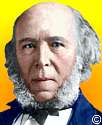 (source)
(source)
|
Herbert Spencer
(27 Apr 1820 - 8 Dec 1903)
English sociologist and philosopher who had early interests in science. He coined the phrase “survival of the fittest” (1852). Spencer published an article defending the theory of biological evolution, seven years ahead of Charles Darwin’s book, Origin of Species.
|
Herbert Spencer Quotes on Evolution (6 quotes)
>> Click for 30 Science Quotes by Herbert Spencer
>> Click for Herbert Spencer Quotes on | Science |
>> Click for 30 Science Quotes by Herbert Spencer
>> Click for Herbert Spencer Quotes on | Science |
Evolution is an integration of matter and concomitant dissipation of motion during which the matter passes from an indefinite incoherent homogeneity to a definite coherent heterogeneity, and during which the retained motion undergoes a parallel transformation.
— Herbert Spencer
First Principles of a New System of Philosophy (1864), 407.
If a single cell, under appropriate conditions, becomes a man in the space of a few years, there can surely be no difficulty in understanding how, under appropriate conditions, a cell may, in the course of untold millions of years, give origin to the human race.
— Herbert Spencer
Principles of Biology (1865, 1872), 350.
Intellectual evolution … is…, under all its aspects, a progress in representativeness of thought.
— Herbert Spencer
In The Principles of Psychology (1872), Vol. 2, 535.
Now, we propose in the first place to show, that this law of organic progress is the law of all progress. Whether it be in the development of the Earth, in the development in Life upon its surface, in the development of Society, of Government, of Manufactures, of Commerce, of Language, Literature, Science, Art, this same evolution of the simple into the complex, through a process of continuous differentiation, holds throughout. From the earliest traceable cosmical changes down to the latest results of civilization, we shall find that the transformation of the homogeneous into the heterogeneous is that in which Progress essentially consists.
— Herbert Spencer
'Progress: Its Law and Cause', Westminster Review (1857), 67, 446-7.
The advance from the simple to the complex, through a process of successive differentiations, is seen alike in the earliest changes of the Universe to which we can reason our way back, and in the earliest changes which we can inductively establish; it is seen in the geologic and climatic evolution of the Earth; it is seen in the unfolding of every single organism on its surface, and in the multiplication of kinds of organisms; it is seen in the evolution of Humanity, whether contemplated in the civilized individual, or in the aggregate of races; it is seen in the evolution of Society in respect alike of its political, its religious, and its economical organization; and it is seen in the evolution of all those endless concrete and abstract products of human activity which constitute the environment of our daily life. From the remotest past which Science can fathom, up to the novelties of yesterday, that in which Progress essentially consists, is the transformation of the homogeneous into the heterogeneous.
— Herbert Spencer
Progress: Its Law and Cause (1857), 35.
This survival of the fittest implies multiplication of the fittest.
[The phrase “survival of the fittest” was not originated by Charles Darwin, though he discussed Spencer's “excellent expression” in a letter to A. R. Wallace (Jul 1866).]
[The phrase “survival of the fittest” was not originated by Charles Darwin, though he discussed Spencer's “excellent expression” in a letter to A. R. Wallace (Jul 1866).]
— Herbert Spencer
In Principles of Biology (1865, 1872), Vol. 1, 444.
See also:
- 27 Apr - short biography, births, deaths and events on date of Spencer's birth.
- Herbert Spencer and the Invention of Modern Life, by Mark Francis. - book suggestion.
- Booklist for Herbert Spencer.
 In science it often happens that scientists say, 'You know that's a really good argument; my position is mistaken,' and then they would actually change their minds and you never hear that old view from them again. They really do it. It doesn't happen as often as it should, because scientists are human and change is sometimes painful. But it happens every day. I cannot recall the last time something like that happened in politics or religion.
(1987) --
In science it often happens that scientists say, 'You know that's a really good argument; my position is mistaken,' and then they would actually change their minds and you never hear that old view from them again. They really do it. It doesn't happen as often as it should, because scientists are human and change is sometimes painful. But it happens every day. I cannot recall the last time something like that happened in politics or religion.
(1987) -- 


